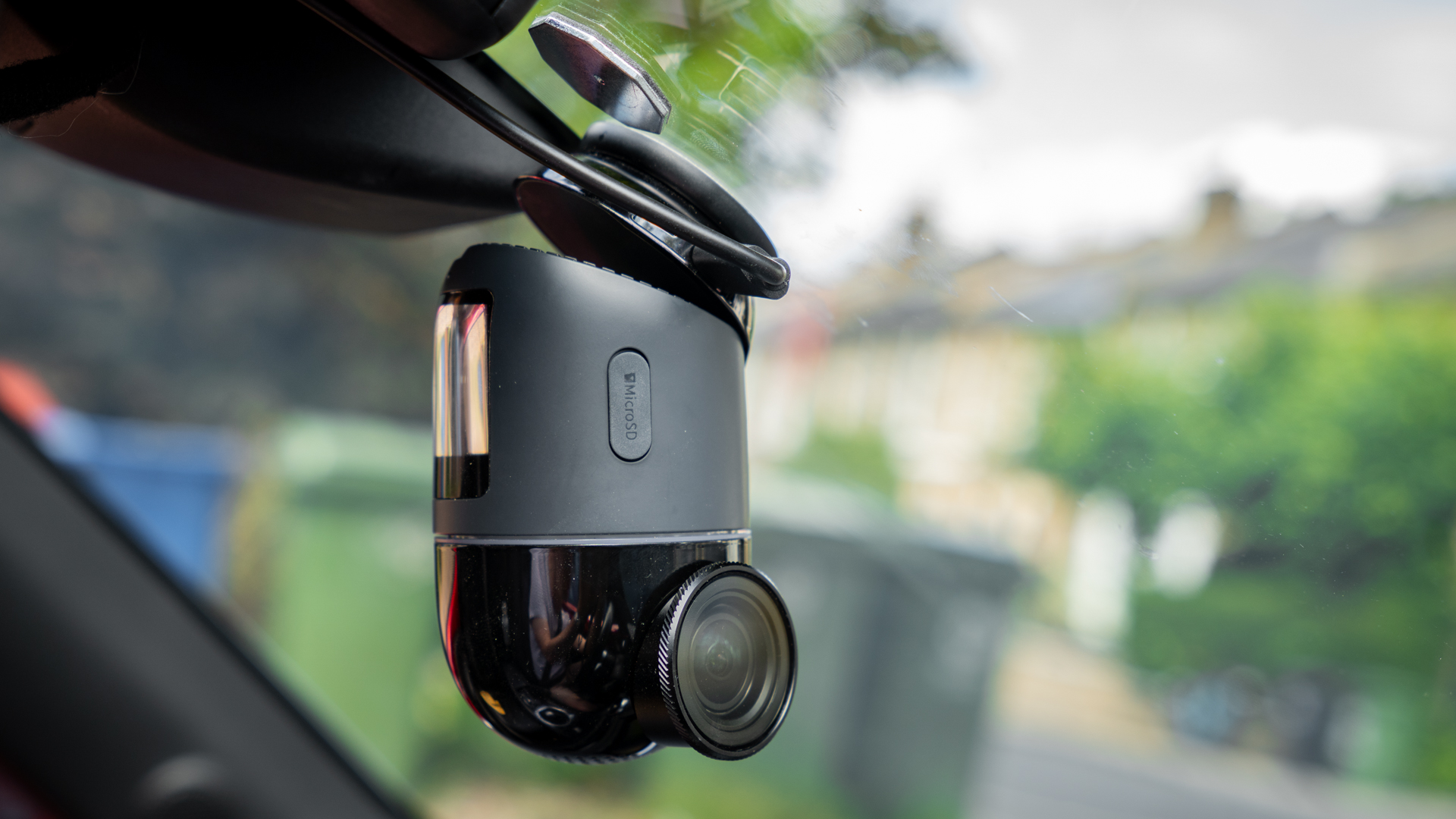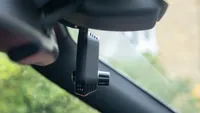Digital Camera World Verdict
The 70mai 4K Omni is a high-end dash cam that fits a very specific set of needs. It shoots excellent footage in 4K with HDR, but also boasts powered panning to give it a 360-degree view. This function works at its best when paired with 70mai’s 4G hardwiring kit and a SIM card with a monthly data allowance. With all that, it turns into an always-on security camera for your car, ready to alert you, record, stream live – and even pan to follow suspicious activity.
Pros
- +
Super-sharp 4K video with HDR
- +
Remote alerts and streaming
- +
Motorized 360-degree view
Cons
- -
Needs a data plan to get the most out of it
- -
Takes up space
- -
Shaky footage
Why you can trust Digital Camera World
The 70mai 4K Omni is a dash cam with a difference. It attaches to the front windshield as normal, but instead of only facing forward, this motorized dash cam can spin through 340 degrees. This helps it record to the sides and into the interior, as well as straight ahead.
While this function is less useful when driving, it comes into its own when parked, since the camera can rotate to follow and record suspicious movement, such as a person loitering around your parked car.
It also packs a Starvis 2 imaging sensor with 4K resolution, HDR, and the option for 60 frames per second. Optional extras include a rear camera and a hard-wiring kit that includes a 4G antenna and SIM card slot, giving the Omni its own data connection for remote surveillance and app notifications, alerting you to parking collisions from afar.
The Omni 4K ticks a lot of boxes and offers plenty of extra features to help it stand apart from other dash cams at this price point. But there’s a lot of setup required, which may put off buyers wanting a set-and-forget system. Is this rotating dash cam right for you? Read on to find out.
70mai 4K Omni: Specifications
Resolution | 4K (3840 x 2160, front camera only) |
Frame rate | Up to 60 fps (30fps when using rear camera too) |
Field-of-view | 360 degrees (including rotation) |
HDR | Yes |
Wifi | Yes, 5 GHz |
GPS | Yes |
Display | Yes, 1.4in |
Battery | No |
Parking mode | Yes, requiring hardwiring |
70mai 4K Omni: Price
Updated for 2025 with a higher, 4K resolution, the 70mai Omni dash cam is priced from $279.99 / £267.79 for the front-facing camera on its own. It is also available with a Full HD rear-facing camera for $310.99 / £306.89. Optional extras also include a hardwiring kit with integrated 4G antenna and SIM card slot, which costs $60 / £42.29.
Unlike other dash cam companies like Nextbase and Nexar, 70mai doesn’t offer a data subscription of its own. Instead, to unlock all of the Omni’s 4G-connected features, you’ll have to pay for your own data-only SIM card.
Given the specification, motorized movement, and option for 4G connectivity, the 70mai Omni seems like decent value for money, especially when some of today’s 4K dash cams can cost more than $400 or even $500.
The best camera deals, reviews, product advice, and unmissable photography news, direct to your inbox!
70mai 4K Omni: Design & Handling
The 70mai Omni is a curiously designed dash cam. Instead of being wide but shallow, 70mai has opted for a narrow but tall design that takes up more vertical space than many other dash cams. This shouldn’t pose a problem in larger vehicles, but if you drive a smaller car or have a car with an especially shallow windshield, the 70mai Omni is going to take up a fair bit of space.
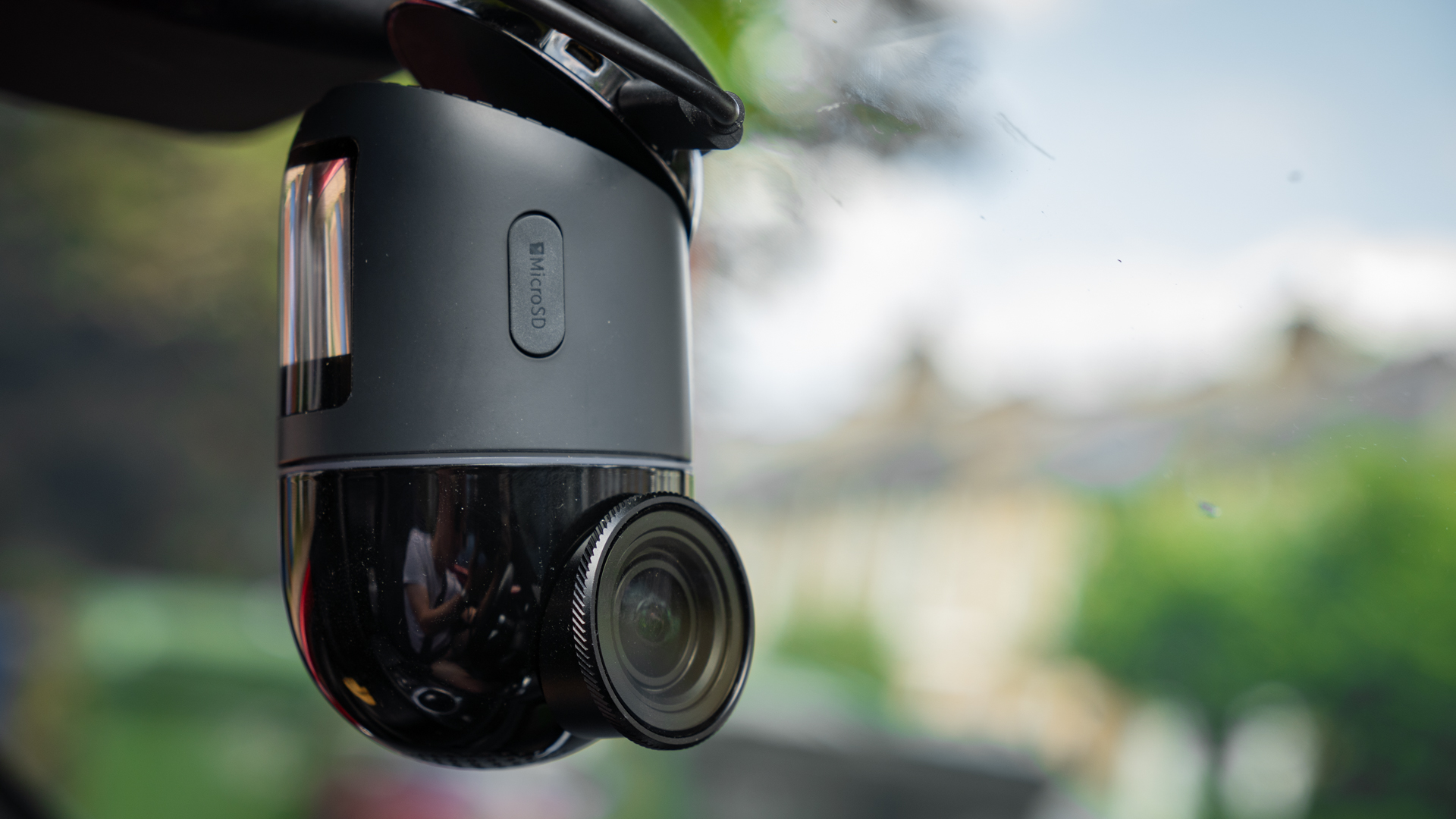
It connects to the windshield with an adhesive pad stuck to a circular mounting plate. This plate can be removed from the dash cam with a twist, and the top of the camera is hinged to offer some vertical adjustability. It’s nicely integrated, but feels a bit too smart for its own good, especially when compared to smaller and far simpler windshield mounts from the likes of Garmin, which offer more adjustability yet take up less space.
There’s a small, 1.7-inch display on the rear, three buttons for navigating the simple interface, ports for power and connecting the optional rear-facing cameras, and a microSD card slot.
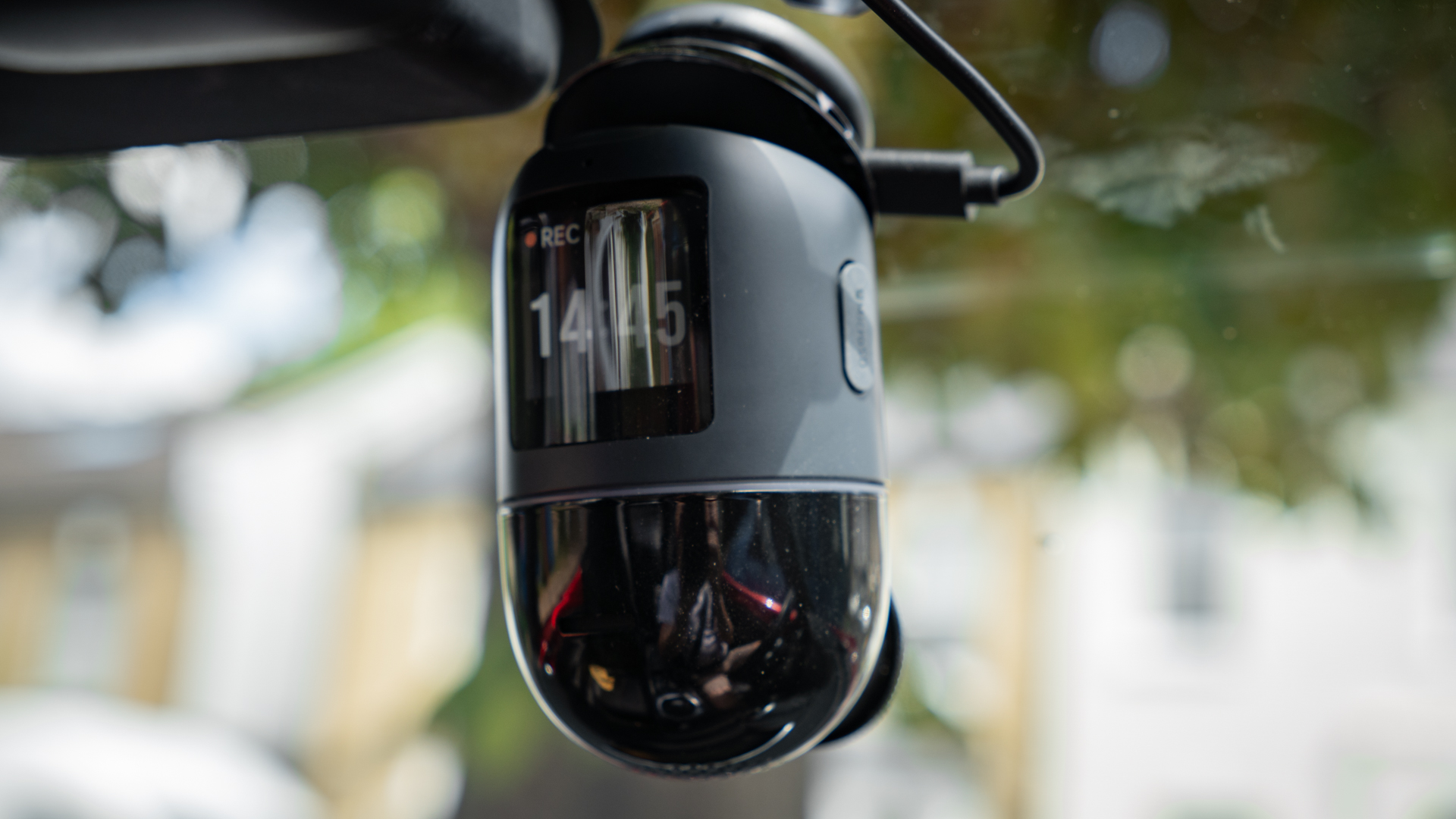
70mai 4K Omni: Performance
Setting up the Omni is quick and easy, especially if you use the included USB cable and 12-volt lighter socket adapter. This way, it plugs in like any other dash cam. If you opt for the hardwiring kit, you’ll have to summon your DIY skills or call out a professional, since for this type of installation, power comes from your vehicle’s fuse box. Furthermore, if you go for the 4G hardwiring kit, you’ll need to source a SIM card and set up a data plan to get the Omni connected to the phone network. In the US, you’re limited to AT&T 4G and Telstra.
It only took me about five minutes to fit the Omni to my windshield, download the 70mai app, and connect the dash cam to my smartphone. This can often be a stumbling block for dash cams, but not this one. After just a few minutes, I had the Omni recording, and I’d also had time to skim through the various settings pages in the app.
Highlights here include video resolution, which defaults to 4K with HDR at 30 fps. The alternative is 4K at 60 fps, but without HDR. Normally, I would suggest going for the higher frame rate, since that can produce high-quality footage, especially when you need to pause recordings to pick out details like license plates. However, HDR does an even better job of pulling out details, especially when it comes to license plates at night, which are often over-exposed by your headlamps. Here, with HDR chosen instead of a higher frame rate, such details remain legible.
Attaching a rear camera lowers the resolution, as it often does with two-channel dash cams, from 4K to Full HD.
On to the video footage itself, and I was initially very impressed. 70mai has clearly thought about what drivers actually want from dash cam footage. So, while the skies look blown out and over-exposed, this tweak to the HDR means there’s extra detail in the lower portion of the frame where it matters far more. I’d always take a white, blown-out sky if it meant the shadows around vehicles and pedestrians were lifted, and that’s the case here. It’s a somewhat heavy-handed use of HDR, but no one expects their dash cam recordings to be cinematic. Detail matters above all else, and it’s clear 70mai knows this.
The Omni’s footage also scores points for being incredibly sharp, thanks to that 4K resolution. There’s loads of detail, making it easy to read license plates, street signs, and everything else you want dash cam footage to capture precisely.
Less impressive is the Omni’s stability. I drive a fairly firm car, but haven’t encountered dash cam footage this shaky for quite some time. Even the smallest bump in the road causes the footage to shudder horizontally, with some blurring of the footage as a result. Again, I don’t expect cinematic quality. This isn’t an IMAX camera. But a bit of optical stabilisation would have been welcome.
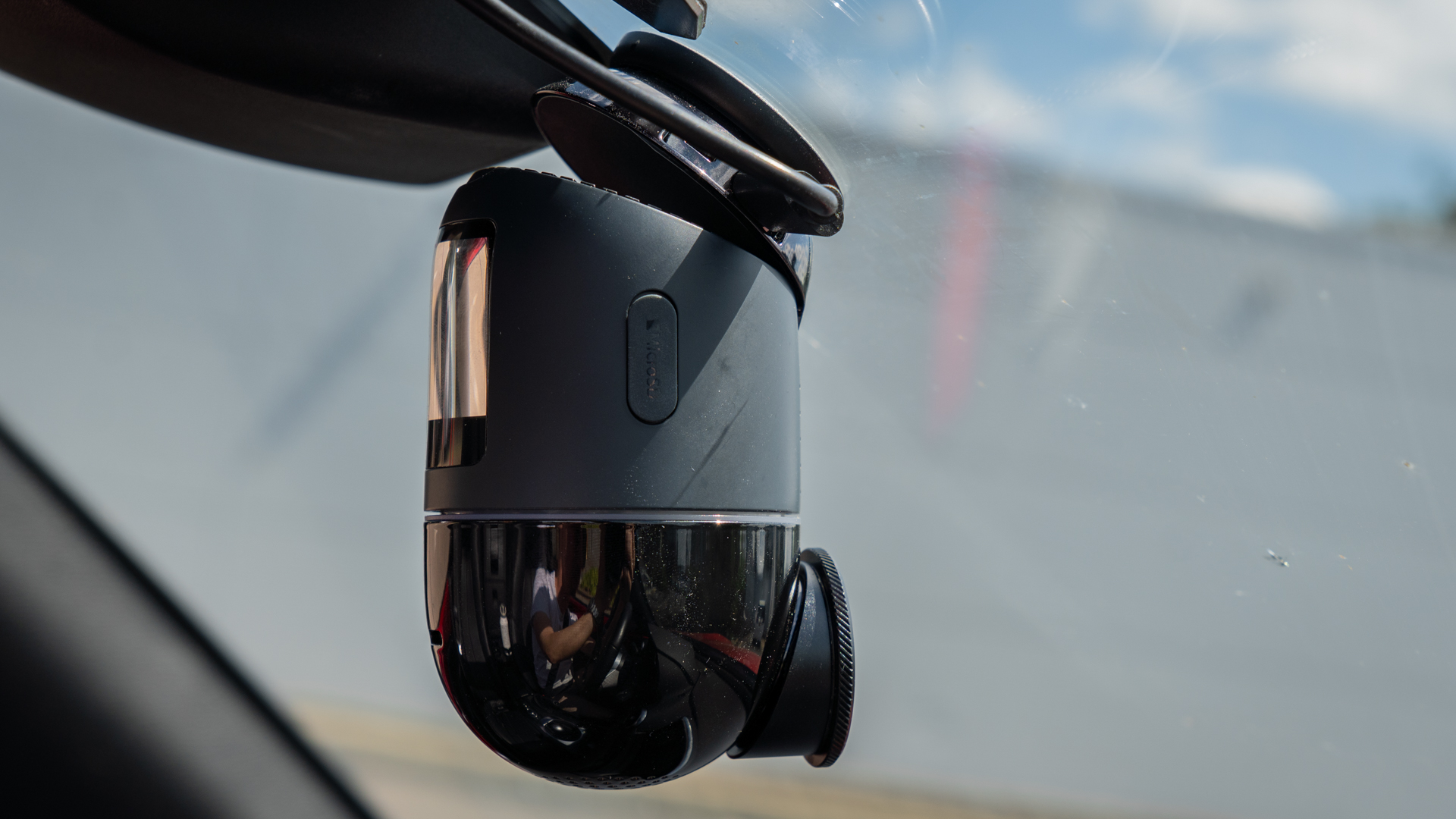
Now for the Omni’s motorized, 360-degree party piece. The camera can rotate with voice commands, quickly turning to the left, the right, or backwards to face the cabin. It’s a neat trick, but I’m not sure how often most drivers would do this. I’m a car guy, so I might ask the camera to spin around and shoot footage of something interesting in the next lane – or, more seriously, you could ask it to face the driver’s side when interacting with a police officer.
But these feel like fringe cases. A better example is when the Omni is installed with a hardwiring cable. This lets you enable the parking mode, which then turns the camera to follow (and record) suspicious movement while your car is turned off. Here, the Omni’s motion starts to make more sense. A spotted subject is tracked and a red status ring illuminates around the dash cam itself, acting as a useful visual deterrent.
This footage isn’t uploaded using the dash cam’s data connection, but like all other recordings it is saved to a 128GB microSD card 70mai includes in the box. The 4G connection also alerts you, via a phone notification, when a collision is detected while parked, and you can view a live stream from the dash cam.
It’s a good feature, and one many dash cam purchases will see value in. However, there is an obvious shortfalling. The optional rear camera does not respond to nearby movement in the way the main unit does, so if someone approaches your car from behind they won’t be recorded and you won’t be alerted. If they break a rear window, the main unit might detect this and start recording, along with the rear camera, but that isn’t guaranteed.
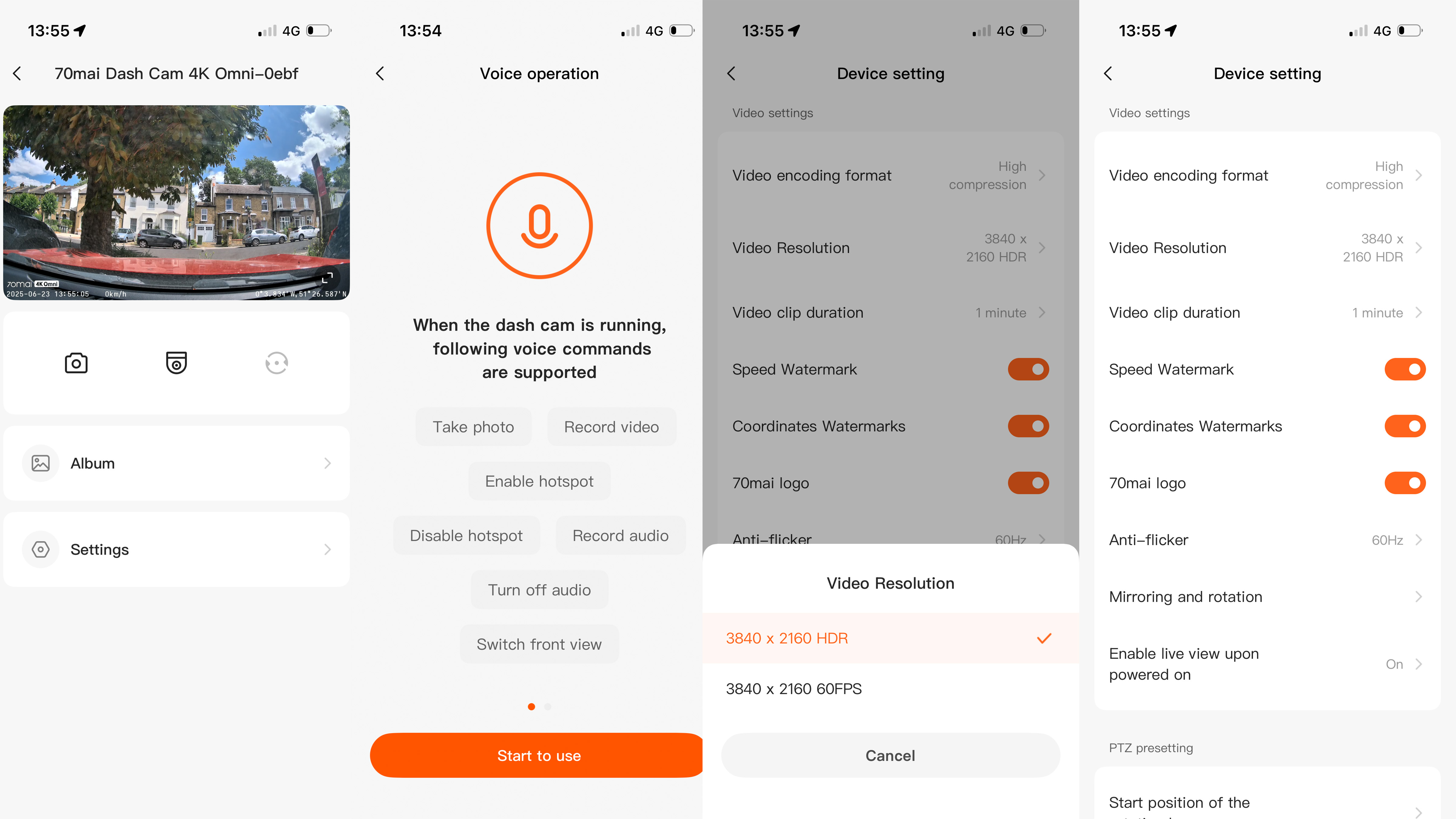
70mai 4K Omni: Verdict
The 70mai 4K Omni produces excellent video and has a lot of scope for offering extra services, like live streaming and a motorized, 360-degree view. It’s a clever dash cam with an innovative design and a feature set that helps it stand out from many of its rivals, even at this slightly elevated price point.
I was especially impressed by the speed of the setup process and the sharpness of the 4K footage this dash cam produces. Recordings are pin-sharp and packed full of detail, thanks to HDR and the 4K sensor. While those with firm-riding cars will notice a fair bit of horizontal shake, this doesn’t rob footage of its ability to clearly show what’s going on.
The parking mode with 360-degree movement and live notifications certainly sets this dash cam apart, but it also requires 70mai’s 4G-enabled hardwiring kit, plus a SIM card and the monthly cost of a data plan. It’s a bit of effort, and extra expense, and while it still won’t spot someone loitering around the back of your car instead of the front, I can certainly see the appeal.
Features ★★★★☆ | From its 4K video with HDR, to the motorized movement and option for 4G connectivity, the 70mai 4K Omni is a dash cam that’s packed with features. Some might feel like overkill to buyers looking for a simpler experience, but if you want a data connection and a camera that pans to follow suspicious activity close to your car, this is the dash cam for you. |
Design ★★★★☆ | It’s on the larger side, and the height of this dash cam could be problematic for drivers of smaller cars with shallow windshields. Otherwise, it feels well made and is easy to set up and use. |
Performance ★★★★☆ | The 4K video recorded by this dash cam is especially good. Bright, sharp and clear, it is packed with detail, but suffered from noticeable horizontal movement, especially in cars that ride more firmly than average. |
Value ★★★★☆ | The 4K Omni is certainly on the expensive side, especially if you add in a rear camera, hardwiring kit and the ongoing expense of a 4G data connection. That said, it’s still more affordable than some other connected dash cams with 4K imaging, like the Nextbase iQ. |
✅ Buy it...
- You want excellent 4K video: Dash cam recordings don’t come much better than this. The 4K resolution helps, but so too does HDR, which boosts shadows to pack your footage with all-important detail. It could be smoother though, as footage tends to shake horizontally when driving over bumps.
- You want advanced parking surveillance: This is the only dash cam I’ve tested that pans to follow objects. This comes into its own when the parking mode detects suspicious activity near your car, but isn’t of any use if someone approaches from behind.
❌ Don't but it...
- You want to avoid ongoing costs: Data isn’t free, so if you want to use the Omni as a remote security camera you’ll have to pay a monthly fee for a 4G SIM card. You can sidestep this feature entirely, but you might then be best buying a different dash cam entirely.
- You have a shallow windshield: The 70mai Omni is quite tall, compared to most other dash cams. This shouldn’t be a problem in larger vehicles, but for smaller cars with shallow windshields it takes up a fair bit of space and could be annoying for some drivers.
Alternatives
Nextbase was one of the first to add 4G connectivity to a dash cam, with the iQ. The iQ is available with 4K video, plus there’s an integrated interior camera and a rear camera available separately. Unlike the 70mai, recordings made while parked are automatically uploaded to the cloud.
Alistair has been a journalist since 2011 and used to be Deputy Technology Editor at IBTimes in London. His specialist tech subjects include smart home gadgets, phones, wearables, tablets and dashcams. He is the host of The AutoChat Podcast.
You must confirm your public display name before commenting
Please logout and then login again, you will then be prompted to enter your display name.
